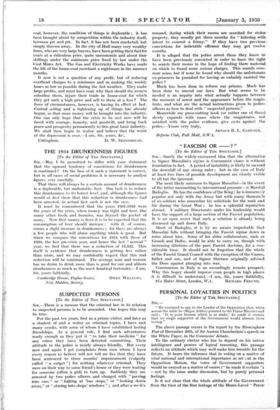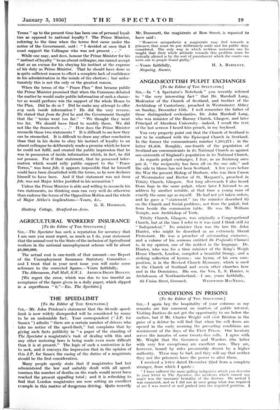PERSONAL LOYALTIES IN POLITICS
[To the Editor of Tan SPECTATOR.] SIR,—
" He ventured to say to the Leader of the Opposition that, when across the table he (Major Attlee) pointed to the Prime Minister and said : 'It is your honour which is at stake,' he made it certain that no single supporter of the Government would abstain from voting."
The above passage occurs in the report by the Birmingham Post of December 20th, of Sir Austen Chamberlain's speech on the White Paper, in the Commons' debate.
To the ordinary elector who has to depend on his native intelligence and powers of logical reasoning, this passage reflects an attitude which may well make him tremble for the • future. It bears the inference that in voting on a matter of- vital national and international importance as set cut in the Opposition Motion, the votes of Government supporters would be swayed as a matter of course (" he made it certain ") —not by the issue under discussion, but by purely personal
feelings. • - -• • Is it not clear that the whole attitude of the Government from the time of the 'first leakage of the 'Hoare-Laval "Peace' - Terms" up toithe present time has been one of personal loyal-, - ties' as opposed to national loyalty ? - The • Prime Minister, referring to the time when the terms first came under the
notice of the Government, said I. decided at once that must support the Colleague who was not present. . ."
While one may, and does, honour the Prime Minister for his "instinct of loyalty-" to an absent colleag,ue, one cannot accept that as an excuse for his obeying his instinct at the expense -of his duty as Prime Minister. That he should have done so is quite sufficient reason to effect a complete lack of confidence in his administration in the 'minds of the electors ; but unfor- tunately this is not the only or the greatest reason.
Virhen'the terms of the "Peace Plan" first became public the Prime Minister promised that when the Commons debated the Matter he would Make Public information of such a charac- ter AS Would perforce win the support of the whole House to the PLari. Did he dO sO ? Did he-Make any atteMpt to offer any such inside information ? He did the very reverse. He stated that from the first he and the Government thought that the " tering- went too far." "We thought they went too far. We shOuld have liked to modify them. We did not like the framework . . ." How does the Prime Minister reconcile those two statements ? It is difficult to see how they can be reconciled. It is difficult to draw any other conclusion than that in his desire to obey his instinct of loyalty to an absent colleague he deliberately made a promise which he knew he could not fulfil, and created the public impression that he was in possession of inside information which, in fact, he did not possess. For if that statement, that he possessed infor matiOn which would rally public support to the "Peace Terms," was bona fide, it appears impossible that he himself could have been dissatisfied with the terms, as he now declares himself to have been. And if that statement was not bona fide, was not Major Attlee justified in his accusation ?
Unless the Prime Minister is able and willing to reconcile his two statements, no thinking man can very well do otherwise than endorse the terms of the Opposition Motion and the whole of Major Attlee's implications.—Yours, Shottery Cottage, Stratford-on-Aron.
G. 11. HOOKIIA3I.











































 Previous page
Previous page